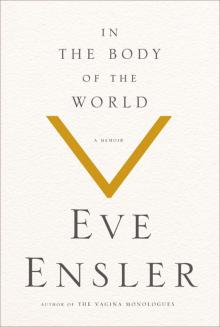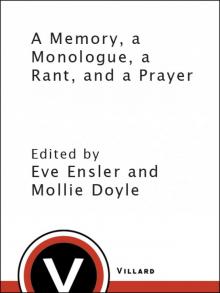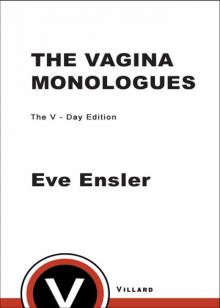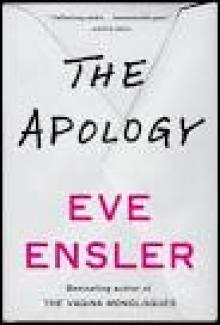- Home
- Eve Ensler
A Memory a Monologue a Rant and a Prayer Page 2
A Memory a Monologue a Rant and a Prayer Read online
Page 2
How could she stand by and watch her daughter be assaulted and do nothing? Did she think the harassment would end? Did she not realize that my mother needed her mother to defend her?
My mother thought of suicide many times. But she had three children. That’s the trouble with heroic stories …
My grandmother passed away seven years ago, and since then another tacit agreement has made me the writer in the family, the keeper of our stories. Members of my family come to me to ask about the past.
And so in writing this story I call my mother to make sure I’ve gotten it right. And I take the opportunity to ask her about these events. “Did you ever ask your mother why she didn’t defend you?”
“I was an adult. I had three children. It was not for her to defend me,” she tells me. “And I think you have part of the story wrong.”
She tells me a different version of my grandmother’s arrival in Venezuela, one she heard from her aunt.
In this version, after my grandfather left the Ukraine to come to Venezuela, my grandmother fell madly in love with a revolutionary Communist. Her father forbade the affair, and the Communist lover, brokenhearted, went to Spain to fight in the civil war. There he was killed in battle. Her father, keenly aware of the imminent war in Europe, forced my grandmother to go to Venezuela and marry my grandfather.
If this version is true, my grandmother’s heroic tales served a deeper purpose than I had originally imagined. They weren’t a code of conduct, or a commitment to revolt; they were simply the longings of an adolescent Ukrainian girl living in the tropics. Heroic actions that she could fantasize about but never act upon.
The real lesson she had learned from her father was: Compromise to survive.
The heroine in my grandmother’s pogrom story might have survived had she compromised. Her brother would have been captured and maybe even lived a few more years had he not used the bullet on himself. But they decided against it.
These stories were the road not taken. The life not lived.
And hence she could dream them, but she could not really teach her daughter how to act on them.
Suicide was good in fiction. Not good in reality. In reality silence and obedience seemed to secure survival.
And heroism was a virtue to admire in a novel or a transatlantic journey. But not a recipe for life …
My mother eventually divorced my father, then married him again and divorced him again. That was ten years ago.
“I’m glad you’re writing this down,” she tells me. “It certainly doesn’t have the flair of your grandmother stories.” She smiles. “It took me a long time and many rewrites, but I finally left your father. And I’m satisfied with that outcome”—she pauses—“and that it didn’t end in suicide.”
1600 Elmwood Avenue
Monica Szlekovics
I remember my first trip to Elmwood Avenue. The ride from my grandmother’s house always took us through Highland Park, and in the spring you could smell the lilacs as they blossomed. Highland Park was a place of great beauty, with all its flower gardens and walking trails, and although we only drove through the park, it created a euphoric atmosphere within my tiny little world as I sat peering out the car window. The euphoria passed as soon as we emerged from the park. The landscape became barren, and in the distance one solitary building reaching into the sky loomed over us.
1600 Elmwood Avenue had a circular driveway, just as many hospitals do, and from the outside you never would have guessed this was no ordinary hospital except for the eerie silence. There were no ambulances or people rushing about. The place was a fortress, with security checkpoints and locked doors. 1600 Elmwood Avenue was a psychiatric asylum.
More often than not, I was not allowed to see my mother because children were not permitted in certain areas of the hospital. However, I do remember one occasion when I saw my mother on a restricted floor, and the moments I spent with her in that room before the staff realized a child was in a restricted area have stayed with me.
The room smelled of urine and was filthy. The windows had bars on them, and the only furniture in the room was two metal tables with benches attached and bolted to the floor. What I didn’t see when I walked in was my mother crouched on the floor in a corner. She saw me, though.
And when she did, she sprang to her feet in a desperate attempt to reach me, but she failed. It was then that I realized she was chained to the floor. My beautiful mother had been reduced to the status of an animal. She had bruises all over her body, and she appeared to be foaming at the mouth. Initially, I was paralyzed with fear, but hysteria soon took over and I was escorted out and taken to another wing of the hospital.
I was taken to the rehabilitation unit, which was equipped with a bowling alley for the patients. I went from one world into another in a few seconds. The patients were happy, talkative, and well groomed. A far cry from what I had seen on the floor my mother was on. It was as if I reentered the park I had exited on my way there. My childhood was marred by incidents like this, and it was from these experiences that I learned there existed a duality in the world, of good and evil. I would spend a great deal of my life entering and exiting its various facets. For I myself am now confined to an asylum that has been conspicuously disguised as a correctional institution.
The Closet
Howard Zinn
I was about twelve. I had three younger brothers, ranging from four to ten years old. It was 1934 or so. Yes, one of the worst years of the Depression. Our family was living in one of the many tenements we moved in and out of in those years, one step ahead of the landlord demanding rent. It was what was called a cold-water flat, meaning: one bedroom for the parents, one bedroom for the kids, a double bed for three kids, sleeping zu fiesens (head to toe, to make more room), and a folding bed for the fourth kid. No such thing as a living room or dining room—unheard of in our circles. A kitchen with a washtub for both clothes and people. A water closet with just a toilet, no sink, no tub or shower. No refrigerator (also unheard of) but an icebox, replenished with cakes of ice carried from the neighborhood ice dealer, melting into a basin underneath that sometimes overflowed in the night, causing a minor crisis. A coal stove on which we heated water when needed, and which provided the only heat for the three rooms.
Was there a closet? I don’t remember, but it is relevant to this little story, because it was winter and my father was sent out by my mother (she made the decisions in the family) to buy a kind of cardboard closet that she had seen displayed in a store perhaps a dozen blocks away. My father was a waiter, now unemployed, an immigrant from Austria, who had met my mother when they were both factory workers in Manhattan. He was about five foot five, strongly built with powerful hands, a quiet and gentle man. My mother was an immigrant from Siberia, slightly shorter, full-bodied, with black hair and a beautiful oval face.
My father went out at dusk, to catch the store before it closed, and came back with the desired closet. That is, he came back with a package of cardboards that, if assembled in a certain way, would constitute a closet. There was a page of instructions, unintelligible to either my father or my mother. He set out to assemble the closet and was baffled in every attempt he made, but he kept trying, with my mother standing by, making suggestions that didn’t work, and his frustration growing by the minute. This must have gone on for an hour, and we boys were standing at the door of our bedroom in our underwear, watching. My father had reached the limits of his ability and his patience, but my mother kept asking him to try just once more. So he did, failing again, terribly frustrated, and when my mother said he should bring it back to the store where he had bought it, his pent-up frustration turned into anger, and he picked up one of the cardboard pieces and brought it down on her head. It was only cardboard and couldn’t injure her, but it was a terrible thing to behold, and we four boys began shouting, screaming at him, crying. Our mother was weeping, our father suddenly chastened. He picked up the pieces of the “closet” and left the house.
I was
reminded of this incident many years later when I read Ann Petry’s story “Like a Winding Sheet.” In it, a black man who loves his wife, though they both work hard for very little, goes through a day of humiliations at work, at the hands of a white supervisor, and then in a restaurant, at the hands of a blond white waitress. He comes home, and when his wife says for him to come and eat, coaxing him with “You’re nothing but a hungry old nigger,” he strikes her with his fist again and again.
What does it all mean? We cannot abide by the violence one miserable person lets loose on another. We must shout and scream, as I and my brothers did, until it stops. At the same time, we must think of the more profound job ahead, to change the conditions of life that drive human beings to violence—men against women, and indeed all violence of one frustrated, angry person against another, one angry, aggrieved people against another.
Darkness
Betty Gale Tyson
with Jerry Capers
As a chile I thought my first name was black, my middle name ugly, and my last name bitch. I had been called a black ugly bitch so much I thought that was my birth-given name. If you’d looked up the words “wounded chile” in the dictionary, there would’ve been a photo of me. Betty Frances Dove. You see, life for me was hard, and my ass was scared from the many beatins my mother discarded. Now please don’t get it twisted, some of the beatins were well deserved, most were in today’s standards just plain ole child abuse. I am the second oldest of eight and that meant my older sister and I had the responsibility of raising the remaining six. Life was not easy; we were dirt-poor, living in the slums of the ghetto. By the age of eight, I was stealing out of department stores because I was tired of wearing my fat-ass-older-sisters’ hand-me-downs. Stealing was so easy because no one paid attention to the little black bitch walkin round the stores robbin them blind. I continued to steal until I got caught tryin to steal a coat for Mother on Mother’s Day. I spent a few weeks in the shelter behind that. I was raped by a family friend at the young age of thirteen; I contracted VD as a result of that rape. By the time I was seventeen, I was tired of the constant ass-kickins and tired of livin in an abusive household. So I traded off. I left my abusive mother and married my abusive husband, Arthur Tyson. Arthur and I lived together as husband and wife for four months. I ran from Arthur and I ran to my first trick. After I started turning tricks, I developed a drug habit. The more tricks I turned, the more drugs I began to use. The drugs allowed me to forget about the abuse, forget about the loneliness, and forget about the pain.
The abuse, the loneliness, the pain, the tricks, and the drugs was nothing compared to the man who stole twenty-five years of my life. William Mahoney was the chief of police, and he framed me for a murder that I did not commit. I was handcuffed to a two-armed chair while eight detectives beat on me repeatedly. I was a trick-turner. I was a drug addict. But I was not a murderer. I tried to take my life in prison because I could not accept the fact that I had to serve twenty-five years for a murder I did not commit.
After my failed attempt at suicide, I began to realize that there was a reason God had spared my life. I accepted the fact that I had to do the time, and I began to reach out to the young girls who came into the system. I worked in the AIDS ward and I took classes in photography. When I accepted the fact that I had to do the time, I found my purpose. If it had not been for the bad choices I had made in life, I would not be here today. I would have died on the streets a long time ago. In 1998 my conviction was overturned and I was released from prison. I continue to tell my story with the hope of saving the youth of today. The choices we make today determine who we become tomorrow.
First Kiss
Mollie Doyle
I was little. Six.
Sports camp—swimming, soccer, and I can’t remember what the third sport was.
But I know there was one.
We moved from activity to activity with tiny beads of sweat on our foreheads.
It was my second day.
The soccer counselor told us that we were going to play in the hockey rink.
It would be cooler.
There was no ice—
a cement oval with white walls scarred by black hockey pucks.
The counselor divided us into two teams.
It wasn’t really soccer.
Just a pack of children chasing a ball around, screaming.
Near the end of that day’s session, I fell and scraped my knee.
Blood gushed down my shin.
Everyone stopped playing.
My giant flap of skin hanging on a jagged piece of cement was better than a leather ball.
One boy dared a girl to touch it.
The counselor sent everyone else off to the pool and took me to see the nurse.
But she wasn’t there.
So, he did my knee up himself—peroxide, bandages, tape—artfully applied so that I could even bend my knee without the tape pulling on my skin.
He told me I had played well and patted me on the back.
I thanked him and went home that afternoon and told my mother that I loved soccer.
The next day the counselor had the group circle up and invited me to join him in the center.
He asked how my knee was.
I told him it was fine.
He asked me how I was going to thank him for fixing it.
I said I didn’t know.
He said, “Young lady, you really don’t know your please-and-thank-yous? How about a kiss?”
I told him kissing was gross.
He laughed and asked the group if they thought he deserved a kiss.
Of course they screamed, “Yes!”
He told me to lie down.
I shook my head and told him I didn’t want to.
He chuckled and gently pulled me down onto the yellow sunburned grass so that we were lying next to each other in the middle of the group like sardines in a can.
I rolled away.
Two kids pushed me back to him.
The counselor grabbed me, pulled my head to his, and kissed me.
Forcing his tongue between my lips.
I gagged and squirmed. It was awful.
The kids laughed.
I wet my pants.
The counselor turned red, grabbed my arm,
pinching the triceps between his thumb and forefinger,
and dragged me to the side of the field.
He told me to go home. To get some diapers.
I ran home and told my mother that I HATED camp—especially soccer—
and that I couldn’t even find a bathroom.
The next day I didn’t want to go back, but my mom insisted, promising me she’d show me where the toilets were.
I did not tell her why I didn’t like camp—especially soccer.
A piece of me was too young to trust my instinct:
to know that kissing was not part of the game.
Twenty-nine years later, I return to that field
and I play with this:
May my daughter’s first kiss,
May your daughter’s first kiss,
May everyone’s daughter’s first kiss
be anticipated and wanted.
Groceries
Abiola Abrams
Plastic? Paper. Thank you.
You/overestimated/the/groceries/you/could/carry.
You figure, as long as the bags hold out, you can leave a couple at your front door and come back for them. So you figure, so you leave two bags, jog up 3 long flights of stairs, and kick your apartment open with your sneakered foot. You mean to put your stuff in the kitchenette and run back down for the tampons, cat food, and way, way, way too many rice cakes. You are not bootylicious; it’s still in to be thin.
So, you/overestimated/the/groceries/you/could/carry.
That glass bottle of apple juice did it every time. You stick the yogurt in the freezer, then you hear his voice. Smooooth, like a wannabe Sunday-night DJ.
Yo, don’t worry, #6, I got it.
/>
And suddenly your dorm number is your name and because You/overestimated/the/groceries/you/could/carry.
You run downstairs to find Bigger, the neighbor’s football-playing boyfriend, stuffing fallen boxes of oatmeal and, uh-uh, tampons into your grocery bags. Luna & her revolving bedroom.
No, I got it, Bigger!
You bellow, angry at yourself for always being so paranoid.
Damn, Shorty, you must be having a hard-ass day.
You nod as Bigger swings your bags easily up past the second floor all the way to the 3rd & you gotta admit, sure does make things easier having a guy around.
Thanks, Bigger, so what do I owe you?
You say, standing between your door & Luna’s door, and you take your bags …
Nowhere.
Bigger pushes your tampons and rice cakes and apple juice through you and shoves you into your safe space, owning it.
Bigger, what the hell’re you doing?!?
Shut the fuck up.
You can’t get past his blade. Your cat screams because the football player with a runny nose wrenches your head backward and slams your door closed with your nose. Your warm blood paints your face. Fist/after fist/after fist/after fist/pounds/into/your/uterus.
Stop weeping, bitch.
Which death will you choose?
Your head hits the floor, and a serrated knife snatches the skin on your throat. Then, in a moment that seems sickly Seinfeld, Bigger can’t hold the knife and get your jeans-n-panties down over your wide hips. He orders you to

 In the Body of the World
In the Body of the World A Memory, a Monologue, a Rant, and a Prayer
A Memory, a Monologue, a Rant, and a Prayer The Vagina Monologues
The Vagina Monologues The Apology
The Apology